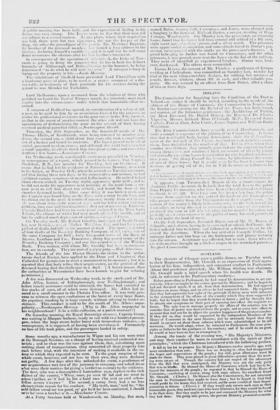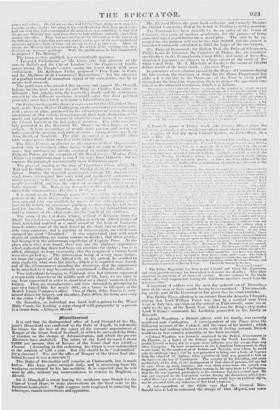The electors of Glasgow gave a public dinner, on Tuesday
week, to their Representative, Mr. Oswald, as an expression of their appro- bation of his firm, independent, and consistent conduct in Parliament. About '260 gentlemen attended ; AL'. William Stirling was chairman. Mr. Oswald made a brief speech when his health was drunk. He said, in reference to his Parliamentary conduct— Before proceeding to Parliament, he had stated his determination to act con- sistently, whatever might be the course pursued by Ministers; and lie hoped he had not deviated much, if at all, from that determination. lie had opposed :Ministers on many things, and on others he had supported them. He regretted that they had apparently lost sight of the principle of doing away with influence in the management of the affairs of the country which they were supposed to hold ; but he hoped that they would do better in future ; and he thought that he already saw symptoms on their part of carrying into effect the requisite re- forms. The only way to manage properly the Afars of the country, was to consider that all power was derived front the people, and to carry into effect no measure that hail not for its object the greatest happiness of the greatest number. If they (lid so, they would he supported by the independent Members of the House of Commons in the next Session; and he anxiously hoped that they would in earnest set about those reforms which were acknowledged to he still necessary. Ile would adopt, when he returned to Parliament, the same prin- ciples as hitherto for the guidance of his conduct; and if he could do no good, he would at least have no fear in attempting it. Among the toasts of the evening was, " His Majesty's Ministers, and may their conduct be more in accordance with the spirit of their principles ;" which the Chairman introduced with the following preface. It fell to his lot to propose his Alajesty's Ministers twelve months ago, with more satisfaction than now. There was no denying it—they bad disappointed the hopes and expectations of the people ; but still, great allowance must be made for them. They were placed in great difficulties—greater than the meet- ing were aware of. Though the country had not reaped all the advantages from the Bill that were anticipated, the Ministry was not the only party that was to blartie. He blamed the House of Commons, which had basely be- trayed the interests of the people; he repeated it, that he blamed the House of Commons,—excluding of course, along with some others, his excellent friend Mr. Oswald. (Cheers.) He blamed also the Constituency, for not returning the men to Parliament they ought to have done; - but he hoped in God they would profit by the lesson they had received, and be more careful of their Repre- sentatives in future. (Cheers.) if they would only return such men as their honourable guest, they need not care who were Ministers, for they would be forced to do their duty. But they ought to be just and commend the Ministry for what they had done. On going into power, the present Ministry promised economy', economy as they ought ; but when it was considered that their Tory predecesors held out that they had economized to the utmost, it %vas something- to find that the present Ministry had saved from three to four millions annual iv, since their coining into Aire. They had preserved rave to the country, in toe free of all the difficulties by which they were surrounded, and io split.. of the atrocious intrigues, both at home and abroad, to drive Le, into war. Above all things, the 3finistry had given us reform ; for which, if for molting else, they
deserved our warmest gratitude. With the qualifications he had enumerated, he proposed " The A(inistry."
The toast, as thus qualified, was received with applause. " Triennial Parliatnents"—" Air, Grote (the firm advocate of the vote by Ballot) and the City of London "—" the Progress of Ititelli- gence among the People"—were among the toasts drunk with most enthusiasm, Mr. Kirkman Fiala) proposed " Free Trade in Corn, and the Abolition of till Commercial Restrictions ;" but his advocaey of a gradual instead of immediate repeal of the corn-duties, was by no means well received.
The gentlemen who attended this meeting- and support Mr. Oswald, belong, for the most part, to the old Whig or Charles Fox party in Glasgow ; but, judging from the toasts they drank, and the sentiments uttered by the different speakers, it would seem that their political principles must have lately undergone a Liberalizing process.
On Friday week a lmi 1amLinner was given to Sir I >avid of New- byth, in the Town Hall of I laddington, on the occasion of presenting- him with a piece of plate, purchased by the subscription of seia n thousand inhabitants of that county, in testimony of their hid' echniretimi of the manly turd independent 111,11111er in \VII !eh 1 IC. :401g1 forward to support the Liberal interest at the last general ideetion. The plate was pub- licly presented in the Reverend Ale hogg's Inetlitig-honse, at two o'clock. A large assemblage of people were present, :old not a few ladies graced the meeting with their presence ; among milers, was Lady Ann Baird, of Newbyth. The plate presented is a splendid silver table centre-piece, ::hunt two feet eight inches high.
The Elvin Cmcier, in allusion to the rumour of *-hell' '\lajest his in- tended visit to Scotland, either before winter or early in the spring, states that workmen are already employed in making preparations at Dalkeith Palace bw the reception of the Royal party.—Mia-niny [Elgin is a roundabout road to travel for news front Dalkeith: but we suppose the paragraph Wit!: originally in an Edinburgh paper.]
The plate of worship at the foot of C%oaliber's where Mr.
Tait and his followers meet, was, Oil set•' , of•- uproar. Durieg the reverend gentlewan's serwon, Mr. .1.1i,,,a.e.;; '— vend times interrupted hict with wild and iiwoherent exei,:enlee : which gave rise to his-deg, and other marks ef o,seopid ebatioo, people assembled, and was the cause of so inueli .dn. that seyerd ladies fainted. Mr. Tait, seeng diet order could not be obtained, dis- missed the congregetion.—Ediabah .1,trvol.
It is stated in an Edirthurgh paper, th Sin:env:Ile, the diseharecil private of the Seots Greys. whose ease excited so much attention some time ago, and who was enabled, by me:ms of Cie suhseription set on foot on his behalf, to commence publican in that city, bus left Scot- land for America. On Saturday, the cancels le. ',err behind hint were sold by warrant of the Magistrate, for the lienclit of his creditors.
The crew of the Caledonia whaler, arrived at Kirkahly front the Davis' Straits fishery, report having Mien in with the Alfred whaler of Hull, which had touched at a such island at the head of Lancaster Sound; where sonic of the men found on the shore two or three port- able soup canisters, and a quantity of tobaceo-pipes, on which were stamped the word "Deptford." It was conjectured (but with what degree of probability, we cannot venture to decide), that these articles had belonged to the unfortunate expedition of Captain Ross. At the place where they were found, there was not the slightest appearance which indicated that there laid been any erections for shelter; but it is
added, although we hope incorrectly, that the remains of a human hand were also picked up. This information being of a very vague nature,
we hope the captain of the Alfred will, on his arrival, be enabled to state explicitly what were the articles which it is reported were found, and all the circumstances attending the discovery, that the importance to be attached to it may be correctly ascertained.—Dundee Advertiser.
Two individuals belonging to Falkland, who had hitherto supported a respectable character in the middle rank of life, have, we are sorry to
say, been committed in order to stand trial on a charge connected with forgery. They are manufacturers, and were detected in attempting to pass two forged bills for nearly 300/., on a house in Glasgow, at the
British Linen Company's office. One of them, John .Annan, is com- mitted direct for forgery, and the other, John Allen, for being accessory to the crime.—Fife. Herald.





















 Previous page
Previous page